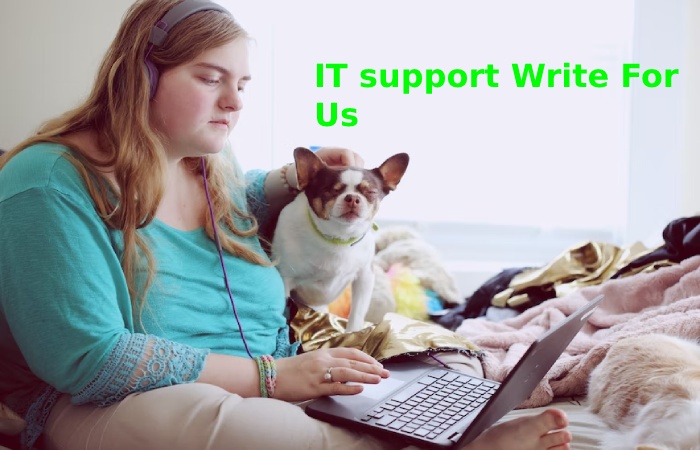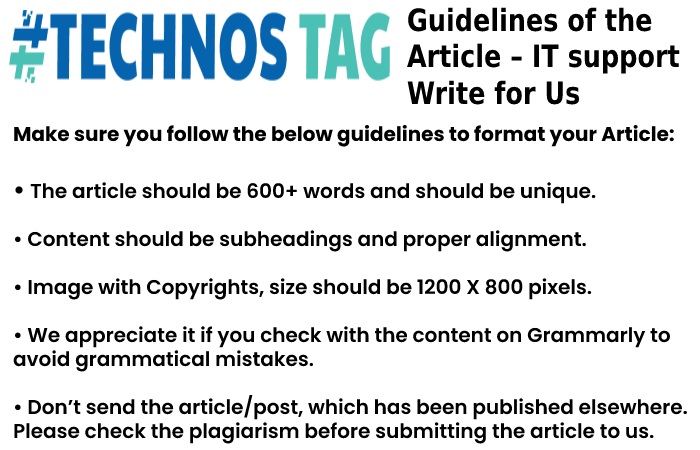IT support Write For Us – System administrators are typically responsible for deploying, maintaining, upgrading, migrating, backing up, monitoring, and troubleshooting major software platforms and underlying hardware systems.
In addition to overseeing the organization’s business requirements, the system administrator researches the most appropriate technology strategies and solutions and builds the most cost-effective and efficient system to achieve these goals.
Therefore, the scope of their responsibilities is vast and essential for any company, whatever its dimension and size.
We have compiled the list of essential questions that we usually ask during a job interview for this position. Prepared?
1 – Tell me about your skills and certifications related to IT management and operations
Many IT operations roles focus on hands-on experience and knowledge of specific areas.
Administrators must have 8 years of hands-on experience on Windows or Linux systems. However, these requirements depend, to a large extent, on the application suites used by the company and the medium-term corporate objectives.
You must go into detail about the types of applications with which you have worked and are interested in those that you will have to manage in your future role.
There are several administration levels in IT systems and operations, and some of them imply having a valid Technical Certification. The most important and required are:
- Microsoft Windows Server
- Microsoft 365 Enterprise Administrator Expert
- Red Hat Certified System Administrador
- Red Hat Certified System Administrator in Red Hat OpenStack
- LPIC
2 – Describe your current functions
This question is intended to assess and determine what tasks you perform daily.
In most cases, system administrators will need to describe everyday tasks such as:
- evaluate software and performance
- provisioning of systems and storage
- software implementation methods
- application configuration and testing
- security processes
- change management models and problem-solving.
Supplementary questions may also be related to understanding and adhering to industry best practices.
The precision of the questions generally varies according to the complexity of the position to be filled. We want to test your technical knowledge.
We may ask you about the following:
- testing and deployment of applications
- virtualization platforms
- load balancing
- networking and TCP/IP protocol
- Experience in Web technologies and HTTP protocols.
You must demonstrate that you can assume from the most basic responsibilities to the most complex.
3 – What computer tools do you use?
IT administrators typically rely on many tools for configuration, deployment, monitoring, and troubleshooting.
For example, the interview questions may be related to tools such as Nagios or Cacti for network monitoring, OpenView for IT infrastructure monitoring, or SiteScope for applications.
You may be required to demonstrate knowledge of Windows PowerShell, Linux Bash, other scripting tools, and help desk software such as Spiceworks or its open-source equivalents ( osTicket, among others).
You do not have to master all the tools, but it will be an advantage if you know some of them
4 – Describe your interactions with other operating divisions, including outside of IT
With these questions, we try to determine your ability to interact with end users and other operating divisions of the company, as well as your capacity to respond to incidents, resolve problems, and keep everyone in the company informed.
You’ll likely have to deal with many issues simultaneously by working with multiple IT teams, such as network and storage specialists while adhering to applicable procedures and standards.
Your ability to handle different problems can be a crucial element in managing pressure and a solid point to highlight during the interview.
5 – What are the application security and disaster recovery practices?
Application security and availability are two very different but equally important aspects.
So don’t be surprised if, during your interview, we ask you about methods for implementing security or disaster recovery procedures.
Questions about application security practices will likely focus on system access or role management, monitoring, analysis, patch management, policies, or procedures appropriate for these activities.
You will need to know how to use specific tools to implement an appropriate disaster recovery method, perform and validate backups, perform test backups and the recovery procedure, and update documentation for process compliance and corporate quality certifications.
6 – How do you solve the problems found in the data centre? Can you take the pressure? What to do in the event of an incident?
The questions we will ask you during the interview about the most severe incidents you have dealt with in the data centre are not meant to point out your mistakes.
We want to find out how you react to the unexpected.
An administrator must be good at troubleshooting, whether it’s restricting user access, balancing application performance, applying the latest patches, fixing configuration errors, or managing underlying hardware failures.
You will need to validate that you are capable of testing and evaluating new versions of a product, anticipating potential integration or compatibility issues, and writing down solutions or ways to fix certain issues.
Troubleshooting often involves the use of tools ranging from simple Windows performance counters to advanced registry/log analysis platforms .
Your mission is to provide solutions quickly , and at the same time resolve them in accordance with current policies and procedures and in accordance with formal escalation procedures .
IT operations team members must be proactive and monitor the application environment to anticipate potential bottlenecks or other performance issues, and then resolve those incidents before they impact users.
You probably won’t have to take a test to prove your skills, however, expect to answer a series of questions about how you approach troubleshooting.

Likewise, You can submit your articles at contact@technostag.com
How to Submit Your IT support Articles (IT support Write For Us)?
That is to say, To submit your article at www.Technostag.com, mail us at contact@technostag.com
Why Write for Technostag – IT support Write For Us
IT support Write For Us
That is to say, here at Technostag, we publish well-researched, informative, and unique articles. In addition, we also cover reports related to:
adapt
attribute
licensor
waived
fair dealing
fair use
moral rights
publicity
privacy
trademark;
right to privacy
common law
tort
passing off
Guidelines of the Article – IT support Write For Us
Search Terms Related to [IT support Write For Us]
write for us page
“write for us” + free
software write for us
write for us + saas
customer experience write for us
write for us + business
[“write for us” + finance]
write for us internet
credit card + write for us
for us”+
write for us + “investment”
loan write for us
gst write for us
write for us + money
write for us business
money crashers write for us
Related Pages
Gadgets Write For Us
Machine Learning Write For Us
Digital Marketing Write For Us
Anti Virus Write For Us
Gaming Write For Us
Hacking Write For Us
Smartphone Write For Us
Web Design Write For Us
Big Data Write For Us
Cloud Computing Write For Us
Software Write For Us
VoIP Write For Us
Data Center Write For Us
Computer Write For Us
5G Write For Us
CCleaner Write For Us
CRM Write For Us
Analytics Write For Us
Data Science Write For Us
Data Analytics Write For Us
Python Write For Us
Tableau Write For Us
Saas Write For Us
Education Write For Us
Data Recovery Write For Us
IoT Write For Us
Android Write For Us
Malware Write For Us
E-commerce Write For Us
PHP Write For Us
Java Write For Us
Cryptocurrency Write For Us


